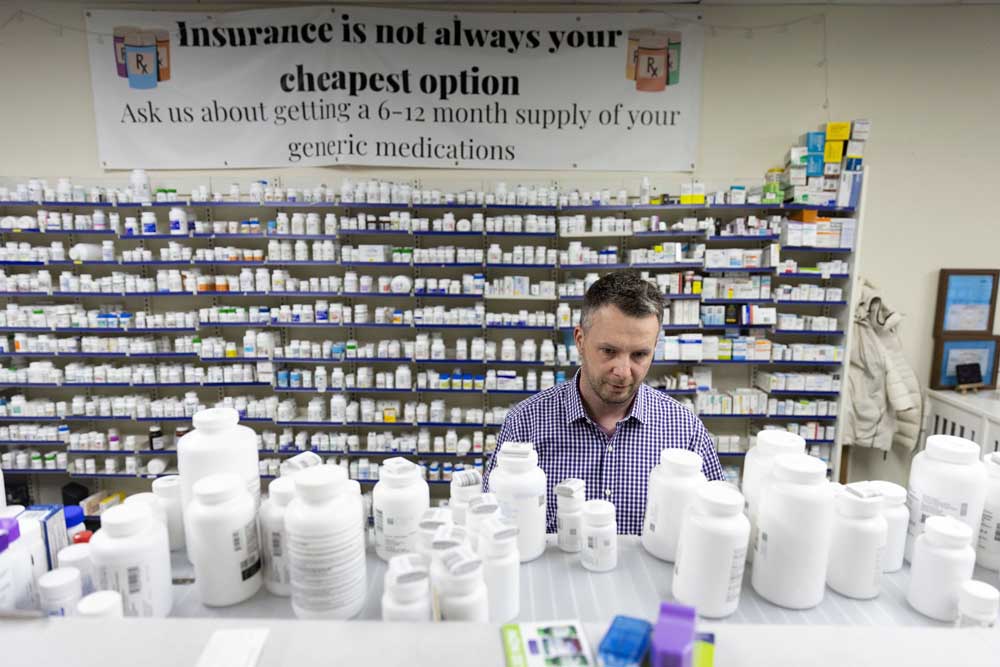Independent pharmacists fight burnout and industry pressures as Rite Aid and CVS close stores
Published 1:15 am Tuesday, February 13, 2024

- Dennis Czerw, owner of Parkway Pharmacy, counts pills in his pharmacy in Philadelphia.
Dennis Czerw, owner of Parkway Pharmacy in Philadelphia, served 175 new customers in January. He was “astounded,” he said, given that vaccine demand dropped off later in the month.
In February 2021, before the COVID-19 vaccine was available to most people, Parkway had 40 new customers. Vaccinations have brought many new people through the door in recent years and several nearby chain pharmacies have closed, but that doesn’t mean Czerw’s business is booming.
“My prescription numbers aren’t growing as much as I’d like them to” for several reasons, he said.
In some instances, Czerw has to turn away a patient because it costs more to get the medication than he’ll get back from the patient’s insurer. He doesn’t like doing that, he said, but he is restricted from changing the price to cover the difference. Sometimes, an insurer will prohibit a patient from patronizing an independent pharmacy such as Parkway, or their co-pay will be lower at a chain.
“Every prescription that comes in the door you have to evaluate for profitability,” Czerw explained. “Too many of the wrong ones can drive you out of business.”
Chain pharmacists across the United States have been speaking out about understaffing, long hours, and unrealistic demands of their jobs as companies such as CVS, Walgreens, and Rite Aid try to stay profitable in a pinched industry. Like independent druggists, the National Association of Chain Drug Stores has said pricing and fees set by pharmacy benefit managers — the companies that handle prescription drug plans for health insurance — are to blame.
Similarly, American Pharmacists Association CEO Michael Hogue recently condemned these benefit managers for “breaking the backs of community pharmacies.” But Hogue also criticized employers that have stayed profitable by placing strict quotas on staff — prescriptions per hour or vaccines per day, or even time on the phone with patients.
At most big chains, “you’re going to spend your day like your hair is on fire,” said Czerw, who used to work at a CVS.
Independent pharmacists say they don’t want to create those kinds of work conditions. But they’re dealing with the same financial pressures as the larger companies and lack control over revenue from their main product, prescription drugs.
Maintaining a full staff
During the COVID-19 pandemic, pharmacists continued to provide essential services, noted Nishaminy Kasbekar, chief pharmacy officer at Penn Medicine and president of the American Society of Health-System Pharmacists. Once a COVID-19 vaccine became available, demand for immunizations only added to the workload, often without the ability to hire more staff, she said.
“When people look at pharmacy they just look at what’s happened in retail,” said Kasbekar, opining that professionals in hospitals have better job satisfaction. Seeing the retail pharmacy environment has “scared a lot of students.”
Pharmacy technicians, who prepare medications under a pharmacist’s supervision, are in short supply, Kasbekar said, and while there’s not currently a pharmacist shortage, lower enrollment at pharmacy schools suggests that could become a problem.
Pharmacy technicians play an important role in keeping the workflow manageable, but chain pharmacies often pay too little, said Daniel Hussar, a professor emeritus of the Philadelphia College of Pharmacy and author of the monthly newsletter The Pharmacist Activist.
Hussar recalled the experience of a former student who became a pharmacist at a Rite Aid in North Philadelphia and lost all her techs to a Wendy’s when it opened nearby because the pay was better.
“Both pharmacists and technicians are under a lot of pressure,” Hussar said. “A comment I often hear from those individuals is, after working a 10- or 12-hour shift … ‘The day was a blur. I just pray that I didn’t make a mistake that might harm someone.’ ”
But independent pharmacies, generally, “have not succumbed to the temptation to understaff,” Hussar said.
People who work at chain pharmacies will jump at the chance to leave and work for an independent store, he added.






